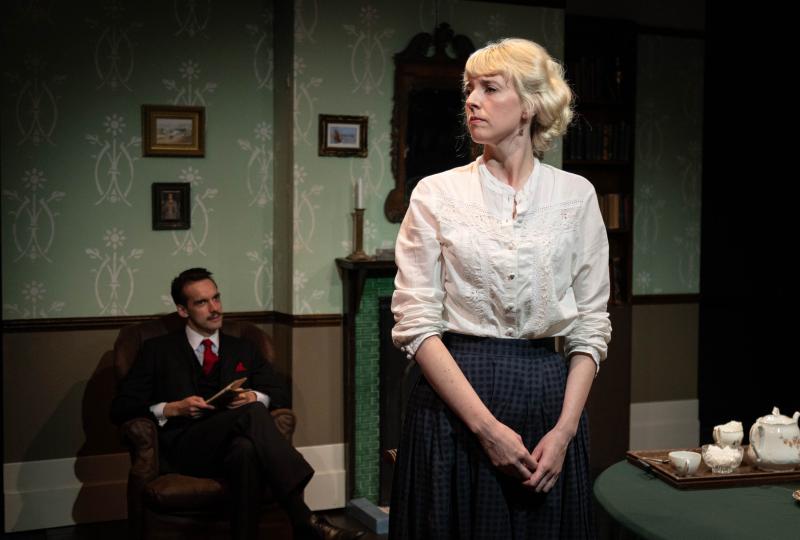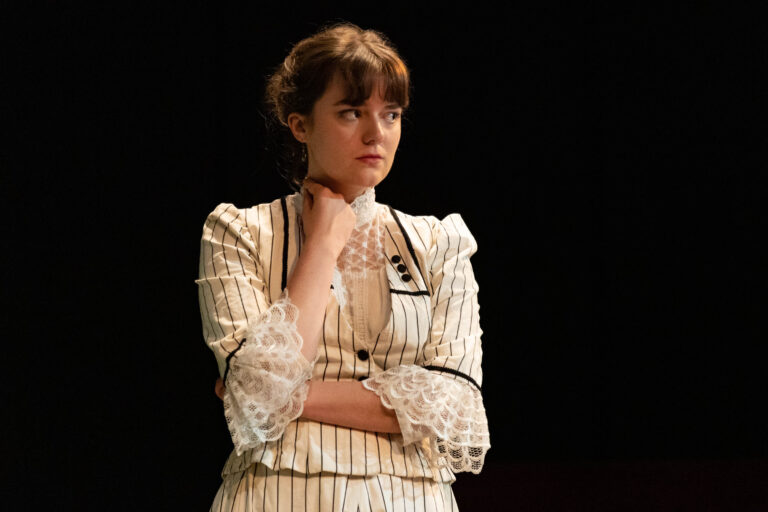Makeshifts and Realities, Finborough Theatre review - Edwardian dramas with a pinch of Chekhov | reviews, news & interviews
Makeshifts and Realities, Finborough Theatre review - Edwardian dramas with a pinch of Chekhov
Makeshifts and Realities, Finborough Theatre review - Edwardian dramas with a pinch of Chekhov
Plays that show that much may have changed for women in the last 100 years, but much remains the same

We’re in (pretty much literally so in this most intimate of venues) an Edwardian sitting room, time hanging heavily in the air, gentility almost visibly fading before our eyes.
Two sisters (young, educated, attractive) bicker with each other. But for the pre-World War One era, they are not young, educated or attractive enough to acquire a gentleman for a husband, their only route out of a long, slow future of the same day repeating for decades. Things might change if the flirtations of man-on-the-make, Mr Smythe, can be converted into something more substantive.
Staged in London for the first time in over 100 years, Gertrude Robins’ Makeshifts (1908) and its sequel, Realities (1911), are two fine examples of the Finborough’s continuing genius in finding forgotten plays, applying the highest of technical standards to the production and delivering an evening that entertains but also invites reflection on the world as it is today. Much credit goes immediately to Alex Marker's set design and Carla Joy Evans' sumptuous costumes that take us into the sisters’ world before we have so much as heard a word.
 At a distance that could be spanned with an outstretched arm, these plays represent a highwire act for the cast, who must convey within 30 minutes or so for each play a torrent of emotions, much of which are suppressed, without us ever losing sight of the fact that these are no caricatures but real people living real lives in 1900s suburbia. When a drama is so dependent on what is not said rather than what is, the actors can sink or swim.
At a distance that could be spanned with an outstretched arm, these plays represent a highwire act for the cast, who must convey within 30 minutes or so for each play a torrent of emotions, much of which are suppressed, without us ever losing sight of the fact that these are no caricatures but real people living real lives in 1900s suburbia. When a drama is so dependent on what is not said rather than what is, the actors can sink or swim.
Philippa Quinn is wonderfully subtle in her portrayal of Carrie, the woman led on by the caddish Smythe (Joe Eyre, veering close to overegging the wide boy stuff in Makeshifts, but perfectly judged as a blazing inferno of masculine entitlement in Realities). Much of Quinn’s best work is done with the looks she casts at the man with whom she is in love - or is she in love with the escape he, and only he, can offer? Poppy Allen-Quarmby’s Dolly is less susceptible to Smythe’s oily charm, but she has her compromises to make too. There’s a Vanya vibe so strong you can feel it!
In the sequel, both sisters have settled for men whom we know they find boring - the makeshifts of the title - and are living a lower middle-class life that becomes the target of Smythe’s vindictive inferiority complex after a softening up from his hideously snobbish wife (Beth Lilly in bitchy form). These days, he would be an incel troll jabbing away online at women to make himself feel better about his own neuroses - back then, he was a sex pest. Drunk, he barges back into Carrie’s life and is seen off (I nearly cheered) by Akshay Sharan’s hitherto mild-mannered Henry Thompson, Carrie’s besotted and courageous husband. Carrie finds a new respect for her husband, only to find her life plodding forward as before.
Is this merely a museum piece, albeit one beautifully delivered? I’d suggest not, as hard-won spaces for women (real world and online) are being eroded every day and the impact of policies like the two-child-limit on universal credit and tax credits force women into relationships with reprehensible men. There are Carries and Dollys all around us today, the circumstances different, but their choices still conditioned by a society that prefers women to be at the beck and call of men: current circumstances, in the cesspit of Twitter and other platforms, provide ample opportunity for men to tell them so. Women's suffrage (an underlying concern in the plays) changed things but maybe not as much as Carrie, if not Dolly, would have hoped.
Honour Thy Father (1912) is the third in the triptych: HM Harwood’s bleak portrayal of an upper-middle class family paralysed by a father’s gambling habit and failing to adjust to reduced circumstances.
Perhaps a little unfairly after we were spoilt before the interval, this one act play feels more forced, less surprising, less relevant, the narrative arc of a weak man unable to resist his addiction and lashing out at those around him overly familiar. One can, however, see how it shocked audiences at the time, with Poppy Allen-Quarmby (pictured above) looking like she has stepped out of a Degas painting and, like many of the women in those works, making a living as a sex worker. But she is no victim, and instead is proud of her commitment toward supporting her feckless family, determined to help her schoolgirl sister into a trade that can give her financial independence and happy to acknowledge the price she has paid. She also skewers men’s hypocrisy with a cruelly accurate tongue.
The director Melissa Dunne cranks things up a little too much in this one, the emotions too large for the space, the subtlety of the early plays lost a little, although there’s a lovely denouement that tells you all you need to know about Andrew Morgan’s blowhard patriarch.
Unlike so many new plays, this triple bill largely allows its social commentary to emerge from character and dialogue, the playwrights adopting a clear stance towards the issues they raise, but not so keen, as many are today, to underline a thematic from first word to last. The drama is enhanced as a result, but we still have plenty to reflect on as we make our way home.
- Makeshifts and Realities at the Finborough Theatre until 2 September
- More theatre reviews on theartsdesk
The future of Arts Journalism
You can stop theartsdesk.com closing!
We urgently need financing to survive. Our fundraising drive has thus far raised £49,000 but we need to reach £100,000 or we will be forced to close. Please contribute here: https://gofund.me/c3f6033d
And if you can forward this information to anyone who might assist, we’d be grateful.

Subscribe to theartsdesk.com
Thank you for continuing to read our work on theartsdesk.com. For unlimited access to every article in its entirety, including our archive of more than 15,000 pieces, we're asking for £5 per month or £40 per year. We feel it's a very good deal, and hope you do too.
To take a subscription now simply click here.
And if you're looking for that extra gift for a friend or family member, why not treat them to a theartsdesk.com gift subscription?
more Theatre
 Hamlet, National Theatre review - turning tragedy to comedy is no joke
Hiran Abeyeskera’s childlike prince falls flat in a mixed production
Hamlet, National Theatre review - turning tragedy to comedy is no joke
Hiran Abeyeskera’s childlike prince falls flat in a mixed production
 Rohtko, Barbican review - postmodern meditation on fake and authentic art is less than the sum of its parts
Łukasz Twarkowski's production dazzles without illuminating
Rohtko, Barbican review - postmodern meditation on fake and authentic art is less than the sum of its parts
Łukasz Twarkowski's production dazzles without illuminating
 Lee, Park Theatre review - Lee Krasner looks back on her life as an artist
Informative and interesting, the play's format limits its potential
Lee, Park Theatre review - Lee Krasner looks back on her life as an artist
Informative and interesting, the play's format limits its potential
 Measure for Measure, RSC, Stratford review - 'problem play' has no problem with relevance
Shakespeare, in this adaptation, is at his most perceptive
Measure for Measure, RSC, Stratford review - 'problem play' has no problem with relevance
Shakespeare, in this adaptation, is at his most perceptive
 The Importance of Being Earnest, Noël Coward Theatre review - dazzling and delightful queer fest
West End transfer of National Theatre hit stars Stephen Fry and Olly Alexander
The Importance of Being Earnest, Noël Coward Theatre review - dazzling and delightful queer fest
West End transfer of National Theatre hit stars Stephen Fry and Olly Alexander
 Get Down Tonight, Charing Cross Theatre review - glitz and hits from the 70s
If you love the songs of KC and the Sunshine Band, Please Do Go!
Get Down Tonight, Charing Cross Theatre review - glitz and hits from the 70s
If you love the songs of KC and the Sunshine Band, Please Do Go!
 Punch, Apollo Theatre review - powerful play about the strength of redemption
James Graham's play transfixes the audience at every stage
Punch, Apollo Theatre review - powerful play about the strength of redemption
James Graham's play transfixes the audience at every stage
 The Billionaire Inside Your Head, Hampstead Theatre review - a map of a man with OCD
Will Lord's promising debut burdens a fine cast with too much dialogue
The Billionaire Inside Your Head, Hampstead Theatre review - a map of a man with OCD
Will Lord's promising debut burdens a fine cast with too much dialogue
 50 First Dates: The Musical, The Other Palace review - romcom turned musical
Date movie about repeating dates inspires date musical
50 First Dates: The Musical, The Other Palace review - romcom turned musical
Date movie about repeating dates inspires date musical
 Bacchae, National Theatre review - cheeky, uneven version of Euripides' tragedy
Indhu Rubasingham's tenure gets off to a bold, comic start
Bacchae, National Theatre review - cheeky, uneven version of Euripides' tragedy
Indhu Rubasingham's tenure gets off to a bold, comic start

Add comment